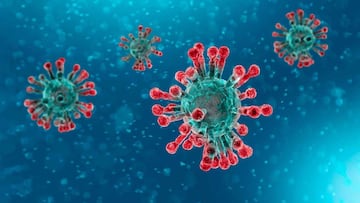What is ‘stealth Omicron’ and where have the first cases appeared?
The more infectious variant had been blamed for the soaring covid-19 case numbers in recent months, but scientists have now identified another version of Omicron.


Last month scientists identified what has been described as a ‘stealth’ version of the Omicron variant, which is difficult to distinguish from other variants using the common PCR tests. With identifiability such an issue for experts little is known about how and where the variant has spread to so far.
Omicron has fuelled a surge of covid-19 cases in the United States and further afield in recent months with its high contagiousness allowing it to surpass vaccine immunity more frequently. The stealth version contains many of the same mutations that have made Omicron so infectious.
Read more
- Pandemic should end "in a month" says engineer who predicted its progression
- Is the Omicron variant more dangerous for the unvaccinated?
- What does a faint line mean in a covid rapid home test?
The variant was first found among covid virus genomes in Australia, South Africa and Canada, but that disparate list gives little clue as to where the stealth Omicron first mutated. For now the scientific community is unsure about the scale of the stealth Omicron spread and the vast majority of cases will likely have been included in statistics as being a function of the original Omicron.
Dr Jacob Lemieux, an infectious disease specialist at the Massachusetts General Hospital, explains: "What we don't know and still have almost no information on is what impact this will have on case counts, on hospitalizations, on deaths.”
How dangerous is stealth Omicron?
The new stealth version of the variant has been christened BA.2, the regular Omicron variant is known as BA.1, and has been found in the United States. At least four states - California, New Mexico, Texas and Washington – have a recorded case of BA.2 but scientists remain fairly calm about the prospect of a new version of coronavirus.
Dr Lemieux said of the news: "I don't think it's going to cause the degree of chaos and disruption, morbidity and mortality that BA.1 did.”
"I'm cautiously optimistic that we're going to continue to move to a better place and, hopefully, one where each new variant on the horizon isn't news,” she added.
Omicron Sub-variant BA.2. Update:
— Faheem Younus, MD (@FaheemYounus) January 27, 2022
- Belongs to the Omicron family
- Unclear if it causes reinfections
- Calling it “stealth” or “son of omicron” is media sensationalism
- Delta had sub-variants too…
- Our current strategy works against BA.2.
More here: https://t.co/hv3KnPril4
Related stories
The decision to name the newer variant as BA.2, rather than issuing it a distinctive name, hints at the approach that health leaders as taking. Typically the individual Greek letter names are reserved for the globally threatening ‘variants of concern’ like Delta and Omicron.
Chicago Department of Public Health Commissioner Dr Allison Arwady explained: "Every time there's a new variant, first of all, we will get a name… So if this is something we have to worry about, nobody will call it the 'stealth something,' it would get a Greek letter name."

